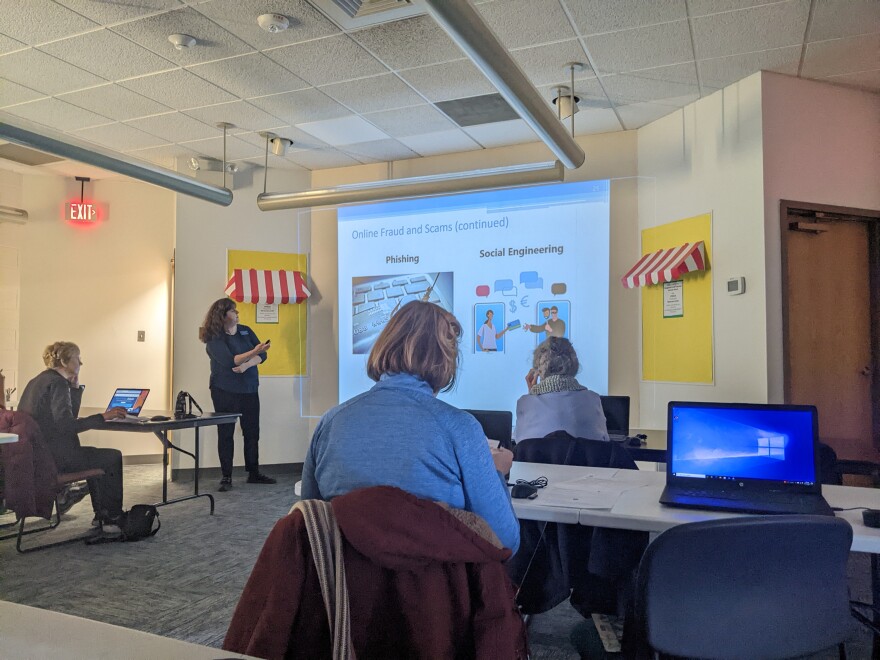EMMAUS, Pa. — Shopping, socializing and working online can be convenient. It also can mean a lot more opportunities to fall victim to scammers and fraud this holiday season.
With both Google and the FBI warning about scams, local groups are also echoing the need to be wary of something that often rears its head around the holiday season but happens year-round.
- A cybersecurity basics workshop at Emmaus Public Library highlighted common types of scams and fraud
- It was part of the library's digital literacy workshop series, which continues in December and January
- Participants were reminded that deals online that appear too good to be true probably are
As part of its digital literacy workshop series, Emmaus Public Library earlier this week highlighted strategies to stay safe online and exercise some cybersecurity basics. The series of workshops, which continue through January, are funded through a grant by the Public Library Association and telecommunications company AT&T.
Topics covered included advice such as having a strong password and how to determine if an email or website is untrustworthy. Participants also completed worksheet exercises to reinforce what they learned.
In addition to tips to combat scams, the presentation covered places they commonly show up and how to notice scams when they masquerade as something legitimate.
"Unfortunately they're everywhere" said library director Maryellen Kanarr, who hosted the workshop.
She says not everyone has grown up using computers, so classes and information like this hope to reduce the digital divide.
"Sometimes, especially if people are beginners, they're not sure what to do when they get a pop-up or they're not sure what to believe when they get an email that might confuse them," said Kanarr. "We've had a lot of people using clicking on websites you might not normally click on, especially with social media these days."
Karen Lauffer attended the workshop and said scammers are not only getting better at what they do. She's also found them to be more prevalent when she's online.
"So it's getting increasingly prevalent to a point of, it's getting tedious to me to even go online or checking now," she said.
Tips to keeping safe online
Common ways to keep yourself safe involve the basics of protecting your password and information while recognizing when someone is posing as something they are not, according to the presentation.
A strong password is recommended to have at least eight characters and at least one uppercase and one lowercase letter, a number, and a special character such as an exclamation point. Avoid using personal information in the password and ensure that you keep it for reference in a place that is not easily accessible and away from your computer, if written down at all. It is also recommended to occasionally change your password.
Kanarr said dual-factor authentication is also great to set up. It's an option now available in most money-focused and even social media apps. You not only have to have your username and password to log in, but also receive a code from another communications service such as phone, text or email for an added layer of security.
Sometimes accounts can be compromised and someone posing as a friend or relative may ask for money over social media. Be wary of that and check in via a secondary means to see if it is a legitimate request, or to let them know that their account has been hacked.
"Sometimes, especially if people are beginners, they're not sure what to do when they get a pop up or they're not sure what to believe when they get an email that might confuse them"Emmaus Public Library Director Maryellen Kanarr
Phishing scams occur when someone is attempting to draw out your personal information, such as a log-in or credit card numbers. For example, emails may purport to be from a company like UPS or PayPal, but when you click the link it brings you to a false website made to resemble the company's, but really exists to steal your information. Phishing scams often appear to falsely come from the IRS, a virus alert or a sweepstakes winner alert.
A common way of noticing a phishing scam, according to the presentation, is to pay attention to the email or website. Look for mistakes or misspellings. If you are alerted to winning something that you never signed up for, that's a good indicator that it is too good to be true.
Also, do not give your credit card information to any website that does not have have https:// in the start of a URL. This means the website is properly encrypted and secure, versus the out of date and vulnerable http://.

Being vigilant throughout the year
Detective Sgt. Adam Knoblauch of the Emmaus Police Department says cybersecurity issues are a concern year-round, not just during the holidays.
"You've got to be cognizant of if the websites are actually legit, and typically, that's very tough, because they become very savvy with how they're creating these things," Knoblauch said. "Basically, on the lines of, if the deal is too good to be true, usually, it's not true."
He reminded attendees that institutions like banks don't typically ask for personal or payment information over the phone. He also said it can be helpful to double-check with institutions and stay aware of the email addresses and phone numbers from which you receive inquiries to make sure any requests are legitimate.
"... if the deal is too good to be true, usually, it's not true."Detective Sgt. Adam Knoblauch, Emmaus Police Department
Knoblauch said another big concern is people stealing mail and packages, potentially looking for checks and messages with personal information on accounts. One way to prevent that is to deal directly with the post office when possible, especially for drop-offs, he said. Another common scam involves people demanding difficult-to-trace gift cards for a payment or non-existent emergency.
"One that's most concerning for us and we're seeing more frequently ... is a lot of times people are convincing victims to legitimately purchase gift cards and provide them with the information for the gift cards," said Knoblauch. "They're basically luring these people into legitimately using their credit card or cash to purchase these things. So it technically isn't a crime.
"Whether it's a government agency or bank or something like that, or if a person in your family was in trouble or custody, gift cards are never going to get anybody out of trouble."
If you suspect something is a scam or you aren't sure, Knoblauch said, it's best to run it past the local police department.
Basic courses for account and password management, online fraud and scam safety, internet privacy and other topics are available at DigitalLearn.org, which is run by the Public Library Association.
The Emmaus Public Library has four additional workshops planned throughout December and January on different digital literacy topics. Sessions run from 11 a.m. to noon.
"I would just probably say that the library's a good place to learn new things and we're always trying to keep up with the times and always trying to make people aware, and they can always come to us with questions," Kanarr said.


